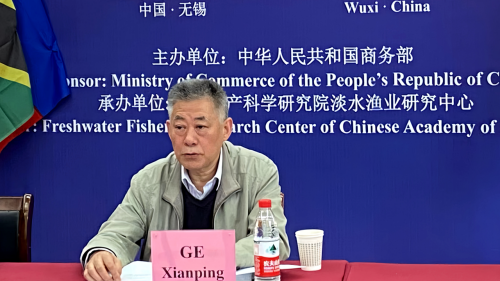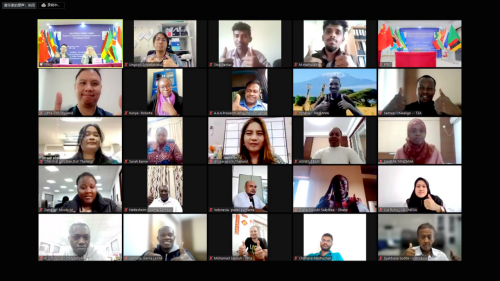On May 10, the “Seminar on Aquaculture Technology Extension for Developing Countries” and “Training Course on Fishery Resource Development and Aquatic Product Processing Technology for Developing Countries” sponsored by the Ministry of Commerce and organized by FFRC were successfully launched. Professor GE Xianping, Secretary of the Party Committee of FFRC attended the opening ceremony and delivered a speech.

Professor GE Xianping said tha in recent years, FFRC has closely followed the national major strategies, actively promoted the development and extension of advanced green and healthy aquaculture technologies and models. He pointed out that the development of aquatic product processing industry plays an important role in building a modern fishery system, promoting the transformation and upgrading of fishery industry, achieving sustainable development of fishery economy and enhancing fishery competitiveness. He hoped that all the participants could learn from each other, improve their understanding of aquaculture extension, fishery resources development and aquatic products processing through the training, and make contributions to the innovation of aquaculture technology of their own countries.
Mme. Robelta Volege, Fisheries Officer of Kenya Fisheries Service, and Mr. Sahr Lamin Sumana, Researcher Assistant of the Department of Aquaculture and Fisheries Management at Njala University, Sierra Leone, delivered their speeches as representatives of the two training courses.

By strengthening fishery talent communication and training, S&T exchange and technical demonstration between China and other developing countries, the two training courses will share China’s mode and experience in the development of fishery product processing industry and technical extension, gradually improve the innovation capacity of fishery S&T development and industrial development level of developing countries, demonstrate China’s fishery strength and wisdom, and contribute to aquaculture technology innovation of developing countries and the realization of the United Nations 2030 Sustainable Development Goals.
It is reported that a total of 117 participants from 13 countries, including Ghana, Sierra Leone, Zambia, Rwanda, Tanzania, Kenya, Ethiopia, Myanmar, Thailand, Sri Lanka, Indonesia, Namibia and the Philippines participate in these two training courses.